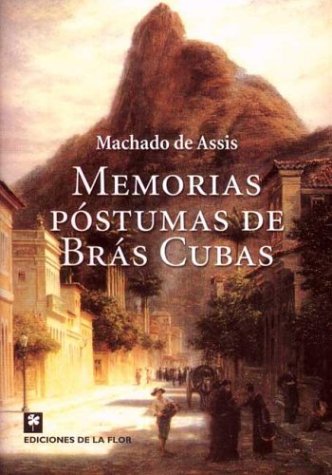


In eloquent, contemporary prose, Costa and Patterson breathe new life into the dynamic character of Brás Cubas and reveal the vivid, tempestuous Rio de Janeiro of his time.

Now, with this coruscating new translation of one of his most compelling novels, esteemed translators Margaret Jull Costa and Robin Patterson reveal a pivotal moment in Machado’s career, as his flights of the surreal became his literary hallmark. And yet, his prodigious output of novels, plays, and stories would influence generations of South American writers. Joaquim Maria Machado de Assis, the son of a mulatto father and a washerwoman, and the grandson of freed slaves, was not, originally, expecting literary encomiums in his lifetime, especially not for Brás Cubas. First appearing in Brazil in 1881, this remarkably experimental novel was never intended by its author to be a popular “run-of-the-mill-novel”. “I passed away at two o’clock in the afternoon on a Friday in August in 1869, in my beautiful mansion in the Catumbi district of the city.” So begins Machado de Assis’ Posthumous Memoirs of Brás Cubas, told eerily from beyond the grave. Machado de Assis’ classic novel, the precursor of Latin American fiction, is finally rendered as a stunningly relevant work for 21st-century audiences. Jull Costa and Patterson offer a peerless translation of this comic masterpiece." (Parul Sehgal, New York Times ) "The most modern, most startlingly avant-garde novel I read this year was originally published in 1881. His masterpiece reads like the best of dreams.New York Times, " Times Critics Top Books of 2020" Thomson-DeVeaux’s limpid translation captures the charm and immediacy of de Assis (1839–1908), who seduces with short bursts of playful autobiography and bursts of exclamation (“Oh! There goes my pen, slipping over into the emphatic”). Matched in his mental peregrinations only by his lifelong friend, the philosopher of misery Quincas Borba, Cubas endows every episode with scintillating digressions on history and literature along with gentle mockery of his own hypocrisy and pretensions. After his betrothed Virgilia is snatched away by a rival, Cubas settles for the life of a libertine. Educated at great expense in Portugal, Cubas fails to live up to early promise as a government minister in Rio de Janeiro.

Now freed from consequence and public embarrassment, he sees fit to begin his memoirs, making a study of his lifelong indolence, dilettantism, and squandered genius. As the novel opens, Cubas dies from pneumonia at the age of 64 and is ferried to the afterlife on the back of a giant hippopotamus. Machado de Assis’s brilliantly idiosyncratic 19th-century Brazilian classic stands alongside Don Quixote and Tristram Shandy as it follows the travails of self-described wastrel and mediocrity Brás Cubas, whose lone achievement in life has been as inventor of an antihypochondriacal miracle cure.


 0 kommentar(er)
0 kommentar(er)
